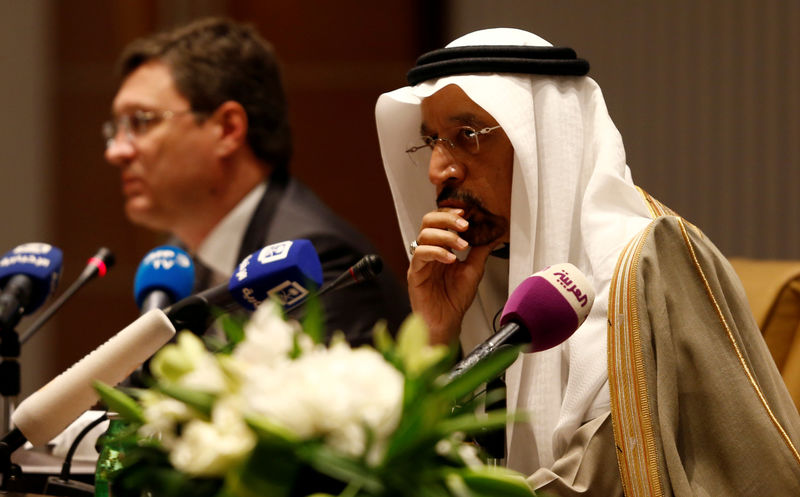By Rania El Gamal and Alex Lawler
KHOBAR, Saudi Arabia/LONDON (Reuters) - OPEC may decide to raise oil output as soon as June due to worries over Iranian and Venezuelan supply and after Washington raised concerns the oil rally was going too far, OPEC and oil industry sources familiar with the discussions told Reuters.
Gulf OPEC countries are leading the initial talks on when the exporting group can boost oil production to cool the oil market after crude rose above $80 a barrel last week, and how many barrels each member can add, the sources said.
The Organization of the Petroleum Exporting Countries and non-OPEC producers led by Russia have agreed to curb output by about 1.8 million barrels per day (bpd) until the end of 2018 to reduce high global oil stocks, but the inventory overhang has now fallen close to OPEC's target.
"All options are on the table," one Gulf oil source told Reuters, adding that a decision to raise output might be taken in June when OPEC next meets to decide on its output policy, but there is no certain number yet by how much the group would need to ease its oil supply curbs.
OPEC and its non-OPEC allies may opt to relax record high compliance with the supply curb agreement, another source said.
OPEC’s compliance with the deal reached an unprecedented 166 percent in April, meaning it has cut well above its target.
"We are still studying the different scenarios," the second source said, adding that even if OPEC decided to ease the output restrictions in June it may take three to four months to put into effect.
"That is one of the options," an OPEC source said, referring to adding more supply at the June meeting.
Falling Venezuelan output due to an economic crisis has helped OPEC and its allies deliver a bigger cut than intended.
Saudi Energy Minister Khalid al-Falih is set to meet his counterparts from Russia and the United Arab Emirates, which holds the OPEC presidency in 2018, in St. Petersburg this week to discuss this issue, sources said.
So far, OPEC has said it sees no need to ease output restrictions despite a fall in global stocks to the group’s desired levels and concerns among consuming nations that the price rally could undermine demand.
But the sources said that the quick decline in global oil inventories and worries about the impact on oil supplies after the U.S. decision to withdraw from the international nuclear deal with Iran, as well as Venezuela’s collapsing oil output, were behind the change in OPEC's thinking.
Concerns raised by the United States that oil prices were too high also made the exporting group start internal discussions, the sources added.
U.S. President Donald Trump accused OPEC last month of "artificially" boosting oil prices.
Last week, Falih, OPEC’s most influential energy minister, said he had called his counterparts in the UAE, the United States and Russia, as well as major oil consumer South Korea, to “coordinate global action to ease global market anxiety”.

Earlier this month, an OPEC source familiar with the kingdom’s oil thinking told Reuters that Saudi Arabia is monitoring the impact on oil supplies of the U.S. withdrawal from the Iran nuclear deal and is ready to offset any shortage but it will not act alone to fill the gap.